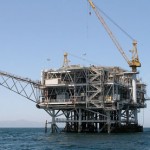Depressed Oil Prices Push OPEC Revenue Below $1 Trillion In 2014

The 2014 crash in oil prices caused the combined oil earnings of OPEC’s 12 members to drop 11 percent from $1.112 trillion in 2013 to $993.3 billion in 2014. It is the first time the group’s revenue has fallen below $1 trillion since 2010.
The organization’s Annual Report 2014, issued June 16, showed the financial damage done to the industry by the precipitous fall in the global average price of oil from late June 2014, when it was around $115 per barrel, to the end of the year, when it was under $60. And members’ combined current account balance fell by 35 percent to $273.6 billion due to a drop in exports and an increase in imports.
All this was due to a global oversupply of oil, due in large part to the recent American boom in shale oil and subsequently by Saudi Arabia’s strategy to reclaim lost market share by keeping production high. This was meant to put pressure on the profits of U.S. producers, whose shale production costs are higher.
During OPEC’s semiannual meeting at its Vienna headquarters in November, the cartel abandoned its practice of adjusting output to shore up prices and instead ignored the pleas of poorer members such as Venezuela and Iran, choosing tokeep combined production at 30 million barrels per day. At its next meeting, on June 5, OPEC decided to keep that production limit.
But shifting OPEC’s focus to a fight for market share has led the group’s members to produce as much as they can regardless of official limits. In 2014, the report said, combined average output was 30.07 million barrels per day, 160,000 barrels per day below 2013. OPEC’s share of the world’s supply of oil also dropped from 33.5 percent in 2013 to 32.5 percent in 2014.
However, the report noted, members’ production has begun to rise. So far this year, the members are producing about 31 million barrels a day, it said. And the International Energy Agency reported last month that Saudi Arabia, Kuwait and the United Arab Emirates, three of OPEC’s wealthiest members, are producing at their highest rate in 30 years.
OPEC’s pursuit of market share will likely keep prices from rising much further in the near term. That probably means lower revenues for OPEC in 2016, Hamza Khan, a senior commodity strategist at ING Bank NV, told Bloomberg by e-mail. “Given the weakness in the first half of [2015], another sub-one-trillion-dollar revenue year remains on the table,” he said.
As a result some OPEC members are having trouble balancing their budgets. Even Saudi Arabia, the organization’s biggest oil producer and wealthiest member, is expected to run a budget deficit of $38.6 billion for fiscal year 2015. At least Riyadh has huge financial reserves that can help to keep the country solvent until oil prices stabilize.
Still, OPEC is planning for the long-term, and Khan believes the cartel can weather this storm and come out ahead. “OPEC members may have been blind-sided by lower revenues last year, but they appear to be mitigating risks moving forward,” he said.
There’s some evidence for his optimism. For example, Venezuela, which originally opposed the Saudi high-production strategy, now supports it. Venezuelan Oil Minister Asdrubal Chavez said June 16 that he expects oil prices to rise by the end of 2015. And last month President Nicolas Maduro announced plans to team up with Russia to invest more than $14 billion in Venezuelan oil projects.
Source: oilprice – Depressed Oil Prices Push OPEC Revenue Below $1 Trillion In 2014




























